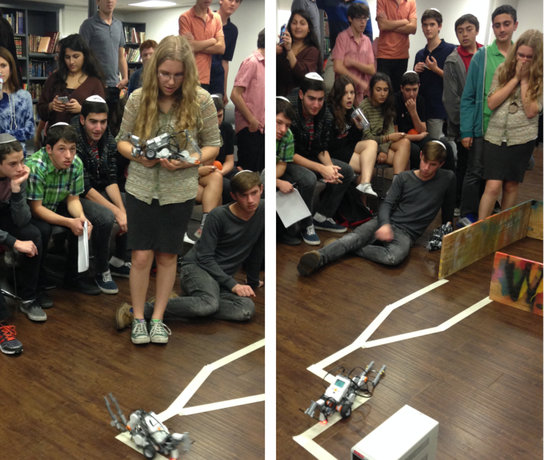Robots compete at Town Hall in tech class demonstration

TENSION: Members of CIJE, the afterschool science and technology class, watch their robots follow a taped path in Town Hall Dec. 19. Though they were programed to do so, none of the robots succesfully picked up the box at the end of the course.
December 24, 2013
Amid loud cheering, stomping, and yelling, student-built robots competed for the first time in Shalhevet history during Town Hall on Thursday, Dec. 19.
The robots — built by ninth and 10th-grade students in the school’s new CIJE class — were trained to back out of a wooden pen, follow a detailed course, and pick up a box.
Trying to follow the course — which was marked with white masking tape on the Beit Midrash floor — half of the robots veered off in different directions.
“It’s harder than it looks,” said CIJE teacher Dr. Jay Smallwood as he watched sophomores Noah Schechter, Mati Davis, and Boaz Willis’s robot get stuck.
And though several got close, none of the nine robots actually completed the task. Several managed to exit the pen, follow the line, stop when they bumped into a computer and turn toward the cardboard box.
Two even managed to touch the box and push it a few inches. But none of the robots managed to pick it up.
CIJE — pronounced “sy-j” — stands for Center for Initiatives in Jewish Education, an organization that is funding classes at Jewish high schools throughout the U.S., hoping to develop students’ interests in science and technology. Except for a Robotics club that met last year, Shalhevet has never offered machine-building before.
Starting in September and meeting twice a week after school, Shalhevet’s CIJE students spent the past four months building and programming the robots as their main projects for the semester.
The students worked in groups of three to build the robots from scratch, using kits from a company called Lego Mindstorm. Students said they received only minimal guidance from Dr. Smallwood and Rabbi David Stein, who co-teach the course.
“This program is all about figuring it out yourself, failing by yourself, and succeeding by yourself,” said sophomore Eric Bazak. “I think this robot could’ve been completed in a week if Dr. Smallwood told us what mistakes we were making, but by having us figure it out ourselves, this program went a really far way.”
Even though no robot won, the robot built by freshman Sarah Yadegari and sophomores Laly Chriki and Daniella Banafshea got the closest to completing the course. It only missed lifting the cardboard box by about an inch.
“I was really shocked that our robot went so far,” said Laly. “When we first started building it, our group was always behind, but once we sorted out the issues, we were okay.”
Dr. Smallwood does not think that the actual competition was so important, and he is grading the CIJE members based on participation.













